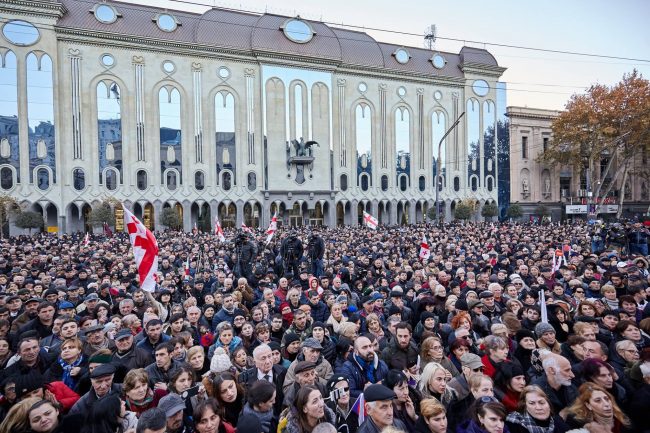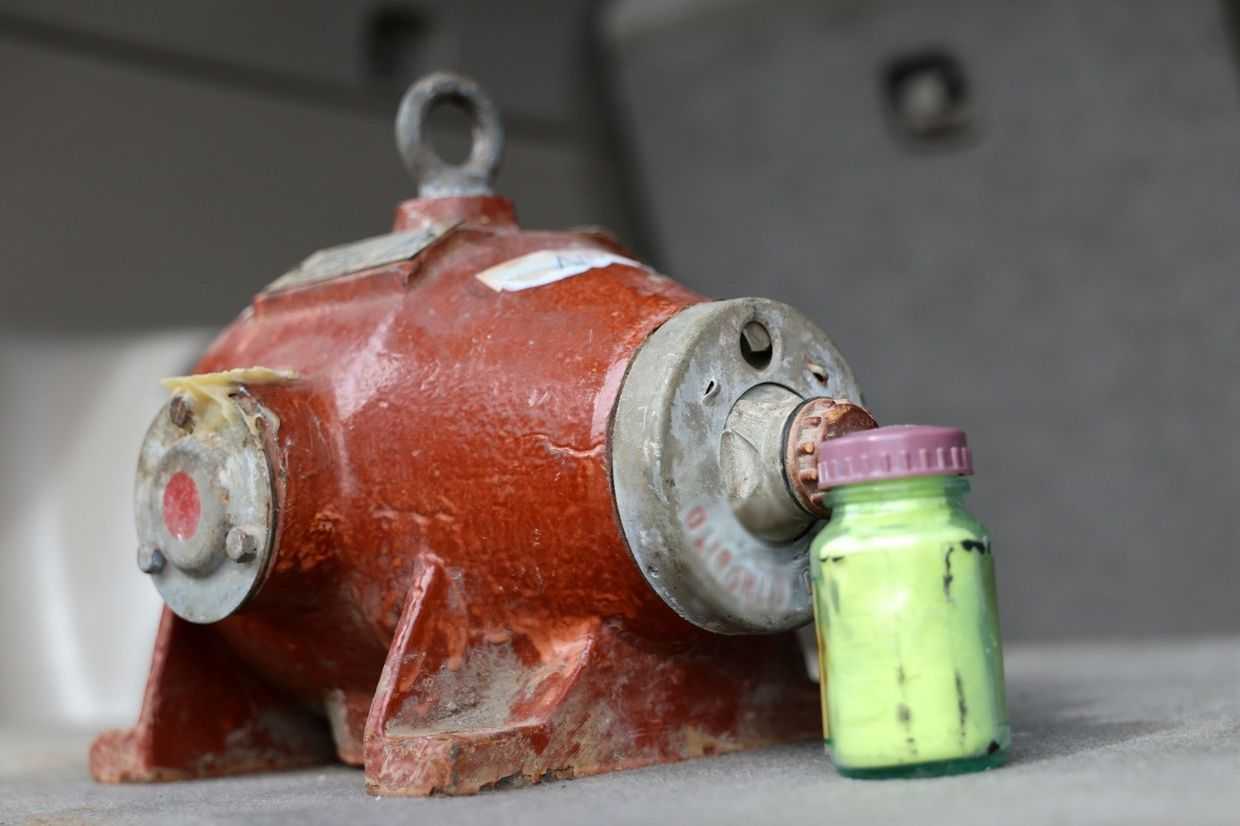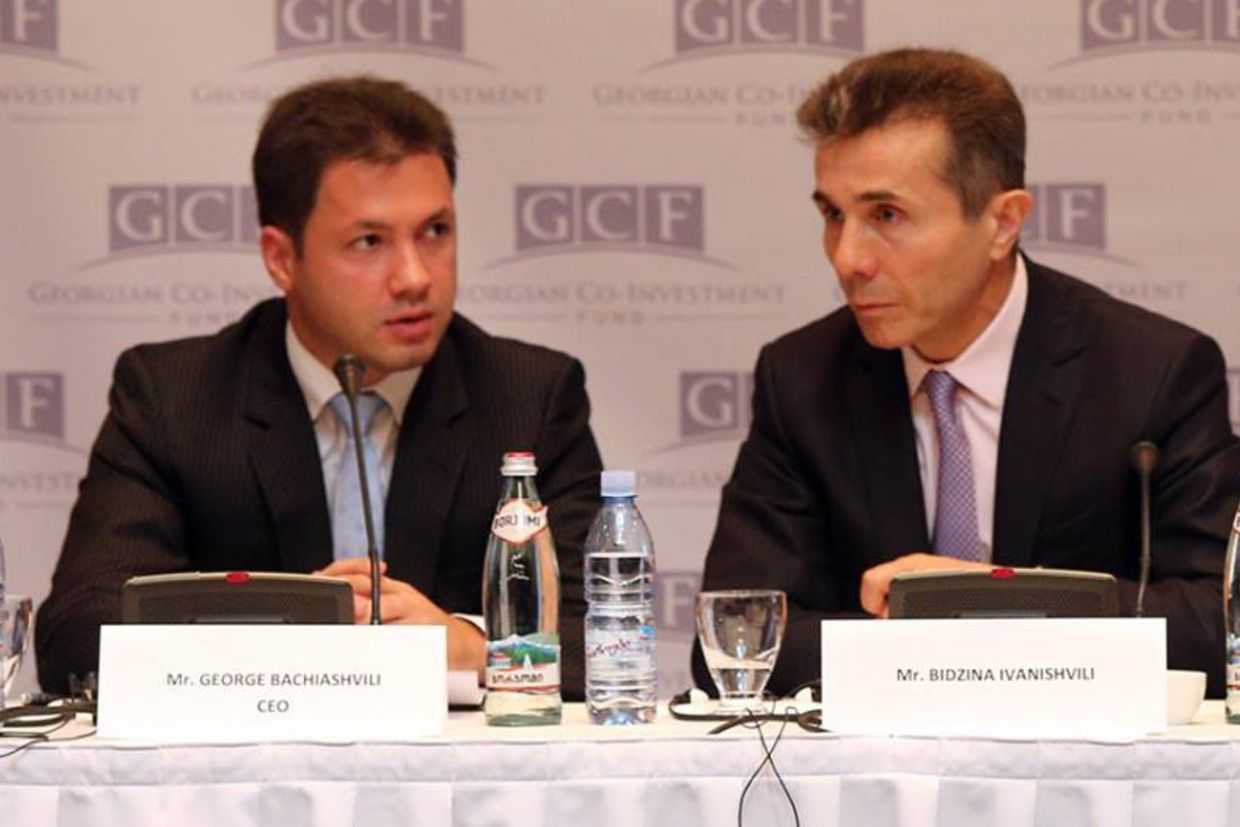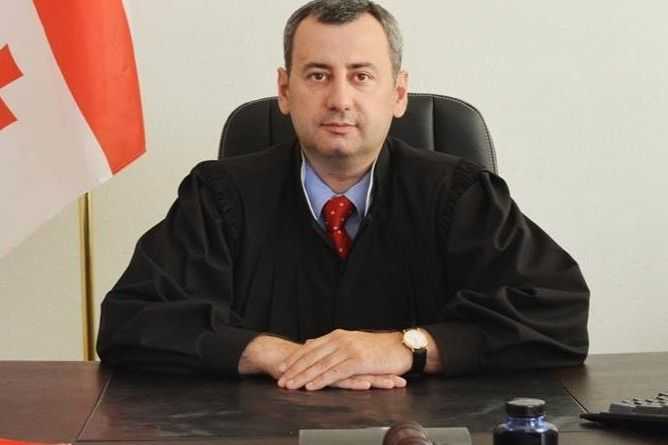

Leaders and supporters of the United National Movement-led opposition coalition gathered in central Tbilisi on Sunday demanding the government negotiate with the opposition before the president-elect’s inauguration day.
At the demonstration in front of Tbilisi’s parliament building, presidential runner-up Grigol Vashadze reiterated he would not concede the election, making it clear that the United Opposition Coalition that he ran under did not plan to recognise Salome Zurabishvili’s victory on 29 November.
Vashadze called the elections a ‘criminal special operation against the Georgian people’.
The opposition contender came second with 40% of votes in the run-off, while Zurabishvili, who was endorsed by the ruling Georgian Dream Party, received 60%, a difference of almost 368,000 votes.
Despite calls before the rally by UNM leader Mikheil Saakashvili for civil disobedience to force snap parliamentary elections, only a few thousand people turned out for Sunday’s protest and it ended peacefully.
Vashadze showed demonstrators what he claimed were fake ID cards that had been discovered and were used to commit electoral fraud. He announced the party planned to mount a legal challenge against the election results.
Vashadze gave the government until 16 December to form ‘a working group to overcome the crisis’.
The central purpose of the working group, according to the opposition’s plan, would be to hold snap parliamentary elections under a fully proportional system.
Georgia currently elects MPs under a mixed system of single-member constituencies and proportional party lists. This is set to change to a fully proportional system once constitutional changes kick in no sooner than 2024.
The opposition also demanded the abolition of district election commissions that, according to them, were ‘instruments for falsification’, and a ban on public officials participating in campaigns.
Zurabishvili’s inauguration as president is expected to be held on 16 December.
While several opposition leaders including Vashadze have several times distanced themselves from more radical suggestions by former president and UNM leader Mikheil Saakashvili, it was Saakashvili who first suggested preventing the government from holding the inauguration ceremony on 16 December.
In a video address to protesters from Amsterdam, Saakashvili, shown on a big screen, vowed to appear by their side the moment they called for him.
Other opposition parties including European Georgia, and the Republican Party, both of whom endorsed Grigol Vashadze in second round, decided not to join the rally.
European Georgia leader Davit Bakradze announced his party would stand ‘in solidarity with’ the demonstration, but said they believed in ‘reforms’ rather than street rallies.
The opposition coalition also claimed their members had been attacked after the second round. In a speech to 2 December’s rally, Vashadze’s former campaign manager, Giorgi Vashadze, announced a hotline and urged people to report any incidents of violence.
What did observers say?
The main international observer missions — from the OSCE/ODIHR Election Observation Mission, NDI, IRI, as well as local watchdogs — did not question the legitimacy of the final outcome.
The OSCE/ODIHR mission called the elections competitive, where candidates were able to campaign freely and the voters had a chance to make their choice.
Abuse of voter mobilisation, frequently with lists of identities of expected voters, could have contributed to influencing voters’ will, if not restricting and controlling their ability to act fully freely, observers said.
Cases of voter secrecy being violated were another sign of undue pressure and intimidation of voters, the mission said.
Aggressive campaign rhetoric turning even more hostile after the first round, isolated incidents of violence, and sharp polarisation, bias, and a ‘lack of analytical reporting’ in the media were also noted.
Observers noted a misuse of state resources, blurring the line between the party and its campaign, and the state institutions.
They also found the involvement of private resources of the ruling party’s chairman, Bidzina Ivanishvili, who promised through the government to help write off the debts of 600,000 Georgians, problematic, possibly amounting to vote buying.
At a meeting on 29 November, the ambassadors of several EU member states urged Georgians to ‘look beyond these elections’ and to take steps towards reconciliation.
On 30 November, the US called on the Georgian authorities to ‘address the shortcomings raised by OSCE/ODIHR and other observers’.
Later that day, Parliamentary Speaker Irakli Kobakhidze vowed they would ‘thoroughly study and consider’ recommendations from the OSCE concerning electoral reform.
President-elect: reconciling society, no talks with Russia yet, ‘more Europe’
in a conversation with the BBC’s Russian Service on election day, Salome Zurabishvili said that Georgian voters had to choose not only between her, a ‘European former diplomat’ and Vashadze, a ‘Soviet diplomat’, but also between nine ‘violent’ years of the United National Movement (UNM)’s rule and Georgian Dream, which she said had given Georgia 6 years of stability.
She called UNM leader and former president Saakashvili a ‘foreigner’ who had ‘lost touch with his country’. She also said unacceptable calls to army and police to disobey Georgian authorities orders after a run-off.
While Zurabishvili has previously been criticised by women’s groups for ignoring legal initiatives in parliament promoting women’s rights and for snubbing a pre-election meeting on women’s issues, she underlined in her interviews to the BBC and Euronews that her election sent a ‘strong signal’ to Georgian women, and would position Georgia better on the international arena.
The president-elect also insisted that as a woman, she would be more capable of building bridges within a polarised Georgian society. She named ‘reconciliation within’ after the ‘violent’ pre-election campaign as one of her biggest initial challenges ahead in her new capacity.
She had stated earlier that overcoming polarisation within Georgian society should be the primary goal before any attempt to reconcile with South Ossetians and Abkhazians.
A day after the run-off, South Ossetian president Anatoly Bibilov told Russian news agency Tass that elections in Georgia would not change Tbilisi’s approach to South Ossetia in any way, as he expected Georgia’s policy of non-recognition and refusing to sign a non-use of force deal to remain in place.
Also on Friday, Abkhazian foreign minister Daur Kove stated that Abkhazia’s independence was not negotiable but expressed a hope that by electing a new president, Georgia would experience ‘a sort of re-evaluation’ which would lay a positive ground for ‘inter-state dialogue’.
In the same interview with the BBC, Zurabishvili named Russia’s recognition of Abkhazia and South Ossetia as a factor blocking ‘all the possibilities of any immediate discussion with Russia’, adding that future talks had to be ‘led and accompanied’ by Georgia’s ‘partners’.
While talking with the BBC and Euronews, she stressed the ‘constant threat’ coming from the ‘occupying line’, wished there was more direct involvement from the European Union along ‘dividing lines’ with territories outside of Georgia’s control.
‘I don’t think that at this time […] until Russia is behaving the way it does on occupying line, where everyday people are abducted, this line is moving and it’s a constant threat that it’s moving inside our territory and very close to Tbilisi, or the way Russia is behaving today with Ukraine — I don’t think that means that we can today enter into a cooperation mode’, Zurabishvili told the BBC.
For ease of reading, we choose not to use qualifiers such as ‘de facto’, ‘unrecognised’, or ‘partially recognised’ when discussing institutions or political positions within Abkhazia, Nagorno-Karabakh, and South Ossetia. This does not imply a position on their status.









